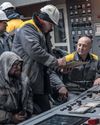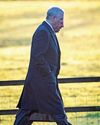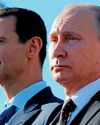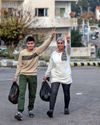
The paratroopers did not head south to Gaza but to the northern border, where they believed a far greater threat than Hamas was poised to join the fight: Hezbollah, the Lebanese Shia movement backed by Tehran.
"We're here to make sure that no one does to us in the north what they did to us in the south," said Reuveni, 40, a master sergeant who in his civilian life does thinktank research on terrorist financing.
"We understand that Hezbollah is much more sophisticated [than Hamas]. We understand it's not 3,000 fighters that come over the border, it will be much more, and you'll also have Iran in the equation. We are here to deal with that."
Reuveni is not alone in seeing Hezbollah as the greater danger. The Israeli defence minister, Yoav Gallant, and other hawks in the cabinet argued for a pre-emptive strike against the militant group in the immediate aftermath of the Hamas attack. That caused alarm in Washington, fearful of a regional war that could pull Iran into the fight.
With US backing, Benjamin Netanyahu fended off the proposal, but the conviction has taken hold among Israeli politicians, generals and a widening slice of the public that a new war in Lebanon is inevitable.
Since they arrived at Rosh Hanikra, where the border meets the Mediterranean coast, Reuveni's 7056th paratrooper battalion has been involved in a low-intensity conflict.
Hezbollah has fired on Israeli border towns and villages in a show of support for Gazans, and Israel has struck back with artillery and airstrikes.
In recent days, the fight has escalated, and the civilian death toll is rising: four Israelis and at least 14 local Lebanese residents. Three journalists have been killed by Israeli drone and tank strikes.
Diese Geschichte stammt aus der December 22, 2023-Ausgabe von The Guardian Weekly.
Starten Sie Ihre 7-tägige kostenlose Testversion von Magzter GOLD, um auf Tausende kuratierte Premium-Storys sowie über 8.000 Zeitschriften und Zeitungen zuzugreifen.
Bereits Abonnent ? Anmelden
Diese Geschichte stammt aus der December 22, 2023-Ausgabe von The Guardian Weekly.
Starten Sie Ihre 7-tägige kostenlose Testversion von Magzter GOLD, um auf Tausende kuratierte Premium-Storys sowie über 8.000 Zeitschriften und Zeitungen zuzugreifen.
Bereits Abonnent? Anmelden

'It's really a disaster' The fight to save lives as gang war consumes capital
Dr James Gana stepped out on to the balcony of his hospital overlooking a city under siege. \"There's a sensation of 'What's next?'. Desperation is definitely present,\" the Médecins Sans Frontières (MSF) medic said, as he stared down at one of scores of camps for displaced Haitians in their country's violence-plagued capital.

Trailblazers The inspiring people we met around the world this year
From an exuberant mountaineer to a woman defiantly facing the guns of war, here are some of the brave individuals who gave us hope in a tumultuous 2024

Votes of confidence
From India to Venezuela and Senegal to the US, more people voted this year than ever before, with over 80 elections across the world. With rising authoritarianism and citizen-led resistance revealing its vulnerabilities and resilience in the face of unprecedented challenges, has democracy reached its breaking or turning point?

Out of touch How president sealed his own fate in martial law gambit
For Yoon Suk Yeol, this month's short-lived martial law declaration wasn't just a catastrophic miscalculation - it was the culmination of a presidency that had been troubled from the start.

Son of the soil Who is François Bayrou, the farmer turned prime minister?
François Bayrou, the new French prime minister, calls himself a country man. A tractor-driving \"son of the soil\" and breeder of thoroughbreds, he has run for president three times, saying his rural roots and centrist politics led him to try to find common ground between left and right.

Power plant workers keeping the lights on
The Guardian Weekly visits a Soviet-era coal-fired thermal installation to learn how it has held up to Russian attacks

Prince charmed Alleged spy scandal may have exposed China threat
Prince Andrew should be commended for doing Britain a great service, according to longstanding China watcher Charles Parton. The now marginalised royal has, the analyst observed, \"almost single handedly\" succeeded \"in highlighting the threat to free and open countries\" posed by the contemporary Chinese state.

In Moscow, a new life of secluded irrelevance awaits Assad
He was whisked away without a last message to his people, the aircraft's transponder deliberately switched off to avoid detection as it departed from an airbase in Syria.

'We fear new oppression' Alawites worry over rebel rule
To prepare khubeiza, the leaves of the kale-like plant must be roughly chopped and sauteed with onions, garlic and a dash of salt. According to folklore, the recipe originated among the Alawite communities who lived in Syria's mountainous coastline where the fibrous, wild-growing plant can be found in abundance. So poor were the Alawites in Ottoman times, the story goes, that the only food they could find to eat was khubeiza, which sprouts like a stubborn weed every spring.

'Gisèle is waiting for explanations'
The Pelicot rape trial has horrified the world. But as it comes to an end, the questions it has raised about French society and rape culture have still not been answered.